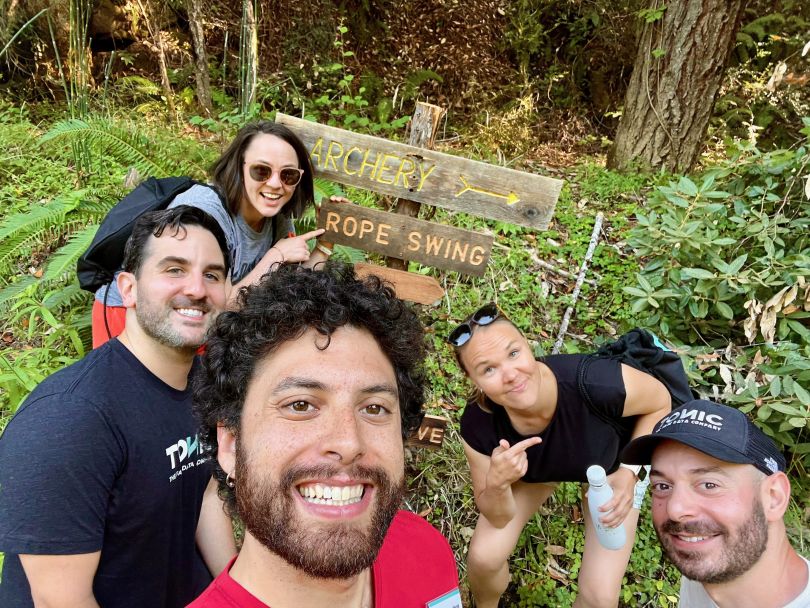Top tech performers are savvy, with around 71 percent of job seekers pursuing internal insight on potential employers through friends and acquaintances before exploring an open role, according to recent Gallup research.
Tech organizations hoping to appeal to virtuoso candidates must be able to clearly define the unique practices and benefits that foster their “it” factor — specifically, their company culture. When Built In NY sat down with six Big Apple tech companies, one thing became clear: Tech leaders aren’t afraid to lift the curtain on the culture markers that define them.
MadHive told Built In NY how it uses its beloved “burndowns” as a tool to whip up engineering engagement, while Yotpo shared the joy of its sales organization’s “walk-out songs” to celebrate closed deals. Life insurance company MassMutual spoke about its “stretch projects” — designed to challenge high performers to hone new skills, dabble in mentorship and otherwise blossom in new and thrilling ways.
To nurture its team of “bar raisers,” Radar rhapsodizes the “we” versus “I,” celebrating wins during its quarterly “Golden Arrow Awards.” Tonic.ai bolsters morale through an annual hand-sent letter from its founders, and Trumid lifts its employees by providing tailored “learning trails” for robust professional development.
From company-wide mantras to bustling Slack channels, these organizations know what it takes to attract and retain top talent — and they aren’t shy about providing candidates with a window into the tangible culture-builders that make their work life rich.
For more than 170 years, MassMutual has helped people secure their future and protect the ones they love. The mutual life insurance company is run for the benefit of its members and participating policy owners.
What are the key characteristics or values of a good team culture, and what are some ways you and your team bring those characteristics or values to life?
A good team is made up of unique skill sets and perspectives. On my team, we have data scientists, product and project managers and software engineers. It’s not possible that we’ll all agree on everything or have the same approach to a given project — I don’t want us to. I encourage a culture of transparency and constructive feedback. Volunteer your opinion but be thoughtful about it — give your reason for disagreeing. That transparency, and the vulnerability that comes with it, lends itself to trust.
Team members know that we have each other’s best interests in mind. “Agree and commit, or disagree and commit” is a mantra we hold close. Whatever it is, we talk about it, but then we align and begin our work. Along the way, we share concerns, findings, and learnings.
Earning trust and maintaining trust is very challenging. There’s nothing easy or routine about it. One way is to be very clear about your values and stay true to them. On my team, we stay consistent with our core principles: clear communication, a commitment to inclusivity and having each other’s backs. Building a foundation the team can rely on leads to innovation and creativity.
‘Agree and commit, or disagree and commit’ is a mantra we hold close.”
How do you ensure members of your team continue to feel challenged, engaged and excited by the work they’re doing?
First, I make it very clear right away how team members’ work fits into the overall organizational strategy. I bring up leadership vision regularly in our huddles (team meetings). This vision can stem from our larger team all the way up to our CEO.
I do this to create enthusiasm and to center our work. The best engineers and data scientists don’t just ask, “What are we going to do?”, they ask, “Why?” As soon as we have that vision and road map clear, we can estimate the extent of any project. We set a north star and work backward from that ambitious goal.
I also like to create opportunities for stretch projects. This could mean helping an employee to learn a new area of the business, mentoring a teammate or taking on new leadership opportunities. I encourage communication. We regularly have team members present their work, both internally and externally. It’s a wonderful way to hone business skills while also building excitement for the work.
Do you have any unique team celebrations, traditions or rituals to celebrate successes? Please offer a real-life example.
I wouldn’t call them unique, but we have weekly huddles at which we do regular shout-outs. We acknowledge the work that goes into every project no matter the outcome — even negative results are results. We use our internal Spotlight platform to recognize team members and celebrate successes. It builds a positive atmosphere and directly affects employee experience. We also use a quick, anonymous feedback tool to keep communication flowing within the team. In addition to making sure everyone’s voice is heard when it comes to feedback, it allows team members to give each other “good vibes” to recognize great work.
MadHive is a technology company engineered for modern TV advertising. Through its self-service platform, advertisers can customize and automate the buying process into one operating system. This allows advertisers to plan, target, activate and measure their campaigns with greater simplicity, accountability, reach and control.
What are the key characteristics or values of a good team culture, and what are some ways you and your team bring those characteristics or values to life?
A key component to a strong team culture is ensuring different perspectives are respected and heard — regardless of title, role or tenure. One of our core values is “Hero your partners,” which means we approach our work with “strong opinions loosely held.” Whether it’s a conversation between the individual engineering teams or a conversation with other members of the organization, everyone is encouraged to voice their perspective so we can come to a decision we all agree upon.
One of our core values is ‘Hero your partners,’ which means we approach our work with ‘strong opinions loosely held.’”
How do you ensure members of your team continue to feel challenged, engaged and excited by the work they’re doing?
We work in an incredibly complex industry with many moving parts. We have the opportunity to leave a footprint as we revolutionize streaming TV advertising. To keep our team engaged and excited, we invest in our people — which helps them feel more invested in our company. Our team members have the mobility to move around other areas of interest and to work on projects that excite them most.
We deal with millions of requests per second — a factor that can increase at a moment’s notice — so we must be mindful of staying current with the technology we use. We’re always vigilant when it comes to learning more about new technology and are encouraged to test it. This gives us the freedom to reimagine what our current architecture may look like if we decide to leverage them.
Do you have any unique team celebrations, traditions or rituals to celebrate successes? Please offer a real-life example.
My favorite tradition is what we on engineering call our “burndowns,” where we gather the team together and create a whiteboard or virtual jam board showing everything we have built recently. Not only is this a fun way for everyone to celebrate what they’ve accomplished, but it also functions as a space to disseminate information about projects.
This also gives our team a space to think about what we may want to approach with fresh eyes and new tooling systems. In addition to “burndowns,” we have Hackathons, company happy hours and holiday events to celebrate all we’ve accomplished.

Tonic.ai was designed to mimic production databases to create safe, high-quality, synthetic data to be used by developers in their local environments. Developers use data generated with Tonic.ai daily to accelerate their CI/CD pipelines in industries like healthcare, financial services, logistics, education and e-commerce.
What are the key characteristics or values of a good team culture, and what are some ways you and your team bring those characteristics or values to life?
Open communication, honesty and positive energy are the cornerstones of our great team culture. Team members knowing that they can rely on one another for information and best practices make a strong company culture. We have weekly meetings to discuss topics outside of work so the team can get to know each other on a more personal level. Beyond that, we have a culture that is built around transparency. This helps us to continually grow and learn from one another and build meaningful relationships despite working remotely.
How do you ensure members of your team continue to feel challenged, engaged and excited by the work they’re doing?
Creating challenges and aggressive goals is healthy to have amongst team members. Having reps who are determined to hit specific targets and consistently improve is a great way to ensure success. Each team member has skill sets that complement one another so we encourage them to branch out and try new things. This not only challenges them, but it also helps them grow professionally.
Each team member has skill sets that complement one another.”
Do you have any unique team celebrations, traditions or rituals to celebrate successes? Please offer a real-life example.
Our Slack channel is always packed with acknowledgments for fellow team members’ accomplishments. All team members are very supportive and celebrate wins together. When a team member does well the memes in our Slack channel get very creative. Receiving an annual company holiday gift, along with a note from the founders in the mail was a great moment, too.
Radar is a geofencing platform, powering use cases like curbside pickup, delivery and location-aware app experiences for brands. Radar aims to help enterprise companies build location-aware app experiences.
What are the key characteristics or values of a good team culture, and what are some ways you and your team bring those characteristics or values to life?
Thinking with the pronoun “we” versus “I”. When someone has a successful product launch, we all celebrate it like it was our own. When someone causes an issue, we do not place blame but work to fix it together and grow from it together.
This has been different than other engineering cultures I have been a part of where everyone was trying to prove they were the best engineer versus focusing on the product. It can be daunting joining a startup with very experienced engineers — as I felt two years ago when I joined. However, when I have made mistakes, it has always been seen as an opportunity to improve.
We create a culture of “bar raisers,” where folks come to Radar to do some of the best work of their careers. We hire top performers who are homed in on excellence.
We create a culture of ‘bar raisers,’ where folks come to Radar to do some of the best work of their careers.”
How do you ensure members of your team continue to feel challenged, engaged and excited by the work they’re doing?
The scaling challenges when working with geospatial software can seem daunting, but it is fascinating. In many areas, scaling is more or less a “solved” problem. Scaling our geofencing offering has been the most algorithmically challenging yet fruitful work I have done thus far in my career.
We have many other areas to solve as we grow, as well as new greenfield products — we’re raising the bar for what location services can look like.
Do you have any unique team celebrations, traditions or rituals to celebrate successes? Please offer a real-life example.
We have quarterly awards that we call “Golden Arrow Awards.” At our quarterly kickoffs, we take time to recognize five individuals who most closely reflect each of our five Radar values: walk a mile, keep it simple, play offense, raise the bar and enjoy the ride. It’s a great chance for the team to celebrate the wins of individuals who have gone above and beyond.

Trumid is a financial technology company and fixed-income electronic trading platform focused on US dollar-denominated investment grade, high-yield, distressed, and emerging market bonds. Trumid aims to optimize the credit trading experience by combining agile technology and market expertise, with a focus on product design.
What are the key characteristics or values of a good team culture, and what are some ways you and your team bring those characteristics or values to life?
We’re firm believers that trust, respect, adaptability and collaboration serve as the best foundation for a healthy team. While there are many qualities to look for in a team, these four characteristics enable groups to find enjoyment in the work they do — and ultimately be as productive as possible.
How Trumid Fosters Culture
- Encouraging collaboration and engagement through an inclusive team environment
- Actively seeking input from all team members
- Taking time to socialize daily
- Being responsive to team members, especially when they need support
- Giving individuals autonomy, responsibility and ownership of technical areas of interest
- Being polite and professional, providing constructive feedback and valuing individual contributions
- Being clear and concise when communicating
- Actively listening to and valuing the ideas of others
- Ensuring that everyone is open to change, continuously learning and growing
How do you ensure members of your team continue to feel challenged, engaged and excited by the work they’re doing?
We provide frequent opportunities for learning and development through tailored online “learning trail” courses for various language and technical learning paths, as well as encouraging all team members to refresh their project initiatives regularly.
We also organically recognize, celebrate and reward contributions. Continual feedback is provided at one-on-one meetings, and we ensure that team members have control and ownership of their work.
We work hard to eliminate bureaucracy and avoid wasted movement — a goal that we strongly believe leads to a more empowering and fulfilling work environment. From top-notch self-service developer documentation and ad-hoc remote environments to technical autonomy, our team has developed an engaging environment with minimal friction and a balanced amount of freedom.
Do you have any unique team celebrations, traditions or rituals to celebrate successes? Please offer a real-life example.
We regularly post shout-outs to our #kudos slack channel to acknowledge the accomplishments and hard work of our team. It’s a fulfilling way to recognize and show our appreciation for one another. Just the other day, I posted in #kudos to thank my team member Ashley for doing an excellent job cleaning up our tooling for service monitoring and alerting.
Yotpo is an e-commerce marketing platform designed to help forward-thinking brands accelerate direct-to-consumer growth. Yotpo’s single-platform approach integrates data-driven solutions for reviews, loyalty, SMS marketing and more — empowering brands to create smarter, higher-converting experiences that sustain customer relationships.
What are the key characteristics or values of a good team culture, and what are some ways you and your team bring those characteristics or values to life?
The baseline of a good culture is trust. You need team members who trust each other and care for each other.
Authenticity is important — it means having the courage to give feedback even if it’s hard. I know if I share an issue I’m having, my teammates will guide me. It’s an authentic group of people.
We build talent by learning from those around us and exchanging best practices for success. We have a culture of openness and making each other better. We genuinely get excited when we see each other succeed.
Finally, positivity makes our culture great. Being in sales, it’s crucial you have an environment that’s life-giving and positive. It’s a performance-based role by nature, and it can be stressful. I genuinely get excited coming to work every day because I’m surrounded by positive people. If I’m in a funk, they’ll listen to me and advise if that’s what I want. We even dressed up as each other for Halloween. We don’t take each other too seriously, and we have fun.
How do you ensure members of your team continue to feel challenged, engaged and excited by the work they’re doing?
In sales, there’s friendly competition. We have a leaderboard to see the deals that have come in this week. We also do morning announcements to look back at the previous day and call out successes — you want to make it into the announcements in the morning.
Another important factor comes from our leadership. If I say I have a unique idea to get in touch with a brand, they encourage me to try these new methods. They foster an environment of creativity.
Being in sales, it’s crucial you have an environment that’s life-giving and positive.”
Do you have any unique team celebrations, traditions or rituals to celebrate successes? Please offer a real-life example.
When someone closes a deal, we play walk-up songs in the office — like a baseball player would have a song coming up to bat. It’s fun, and you get excited to hear it. Mine is “Bad Boy” by Miami Sound Machine. Someone does “Suavemente” by Elvis Cresto. Another is a Mozart song. They’re all unique and different.
We also have incentives that include team activities. One team won cash for their success in the quarter. They used it to go to dinner and a hockey game together. At the end of the month or quarter, we all go out for drinks.
















